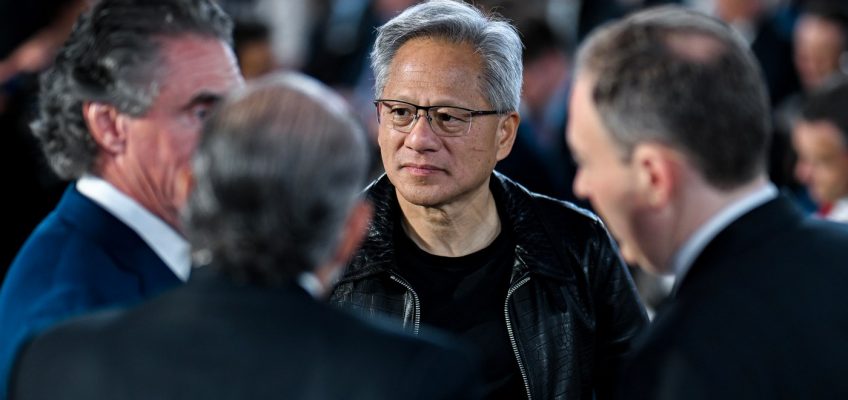The deal that Nvidia CEO Jensen Huang hammered out with President Donald Trump in the Oval Office this month might be good for his shareholders. But it’s bad for America.
After Huang promised to pay the U.S. government 15 percent of the revenue he makes from selling certain artificial intelligence chips to China, Trump called Commerce Secretary Howard Lutnick and directed him to issue the necessary export licenses to allow Nvidia to resume a valuable line of business that Trump halted in April.
With a market capitalization of nearly $4.5 trillion, Nvidia is the world’s most valuable public company and obviously stands to profit handsomely from doing more business in the world’s second biggest economy. (AMD has agreed to the same deal.) And this helps Trump’s trade negotiations with Beijing. The U.S. needs critical minerals that China sells, as much as China needs American-made chips. Both sides are working to reduce these dependencies, but these efforts could take years.
It’s not intrinsically bad that Trump wants to collect more revenue, at a time when the government is spending so much more than it takes in. But this doesn’t seem to be his main motive for making Nvidia and AMD pay for their export licenses.
The Constitution explicitly bans export taxes, which raises questions about whether the agreement is actually legal — though neither Nvidia nor AMD has reason to challenge it in court. In any case, if revenue was the goal, Trump could ask Congress to change the tax code.
The reason the U.S. government previously blocked chip exports to China was national security. Obviously, drawing a few extra billion dollars of tax revenue from chip makers does not mitigate the risks of transferring advanced technology. Trump only undermines international trust that the United States will hold firm when it imposes export controls. (Nvidia says it follows whatever rules the government sets, and Trump’s defenders say the H20 chips that will be sold are not the best available.)
Trump’s side deal is best viewed as inappropriate state intervention in the U.S. economy. Word has gone out that CEOs can kiss the president’s ring by offering to give him something he wants and in return be exempted from whatever policy threatens to damage their business. In this way, companies deepen their dependence on government and on Trump personally.
The chief executive of Intel demonstrated this same concept when he came to the White House after Trump had called on him to resign for allegedly being too cozy with China. Lip Bu-Tan flew across the country to persuade the president that he should keep his job. Intel received billions in federal subsidies as part of the industrial policy enacted during President Joe Biden’s term, and now the chip maker needs to get on good terms with the new occupant of the White House.
These are not the only examples. Recall how Trump finagled a “ golden share ” of U.S. Steel for the federal government as a condition for allowing Nippon Steel to take over the company. On the same day Trump met with Huang of Nvidia, Apple CEO Tim Cook gave the president a glass disk with a 24-karat gold base as he announced a $100 billion investment in U.S. manufacturing facilities. This freed the iPhone maker from new levies that Trump announced on semiconductors.
The president has also demanded large “signing bonuses” with other countries as a condition for agreeing to trade deals. The leaders pledge major investments in the United States and promise to give Trump a say over how the money gets spent.
Corporate chieftains have been far more muted in their criticism of the president than they were during Trump’s first term, because they fear retaliation if they fail to sing his praises. And when big companies get audiences with the president to negotiate special deals, these often come at the expense of smaller players who are unable to pay top lobbyists. Erecting such barriers to entry reduces competition.
It would be an exaggeration to equate this new economic order with China’s state capitalism, but there are echoes. The U.S. government has meddled in private enterprise in the past, especially during wartime, and it has bailed out companies during financial crises. Biden used government largesse to prod companies to give special treatment to unions and minorities. But Trump is the only president to make his dog and pony show an everyday reality of doing business in America. Now that this door is open, a future Democratic president might be even more aggressive in advancing his or her ideological aims. Any CEO who is pleased with how things are working right now should remember that they could find themselves out of favor under the next administration.
Government has never been good at allocating private capital or picking winners and losers in the marketplace. Even trying to do so makes companies overly dependent on the White House. And it makes the U.S. economy less vibrant.
— The Washington Post
Related Articles
Steven R. Furlanetto: Defunding science? Penny wise and pound stupid
Michelle Goldberg: Echoes from Poland as Trump tries to make museums submit
Andreas Kluth: Expiring deals, rising China, rising tech, rogue dictators = rising nuke risk
Bill Dudley: The Fed’s under siege. It’ll be just fine
Letters: Reassuring to see work in St. Paul toward understanding our common humanity


Leave a Reply